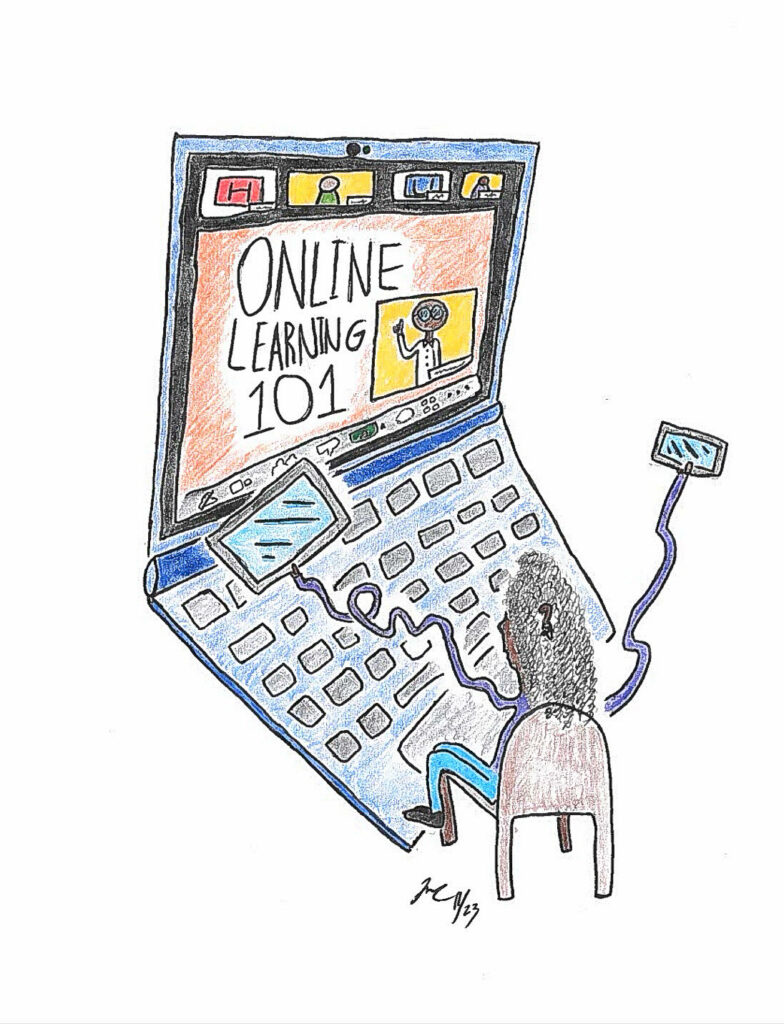
National Distance Learning Week, which was earlier this month, sparked discussion amongst the Howard community about the prevalence of online learning at the university. With many appreciating the different needs of students that online learning considers, others noted the difference in engagement in online versus in-person engagement, and their desire to participate more in online class class.
Some students appreciate the way that the classes adjust to the virtual environment by adjusting workload. However, they were also concerned about the way online learning caused them to lack focus.
Junior marketing major Makaylah Yarn from Syracuse, New York, highlighted several differences between online and face to face learning. “I feel like the workload is easier than an in-person class,” she said. “I like my online classes, but if I don’t have to do anything, I’m most likely sleeping in the class.”
“I feel like we have to factor in that people live off campus. Me going to my in person classes gets me out of my room, it makes me productive,” Yarn continued. “When I go to campus I tend to do more, I tend to be more productive with my day.”
Following the COVID-19 pandemic, several courses at Howard have transitioned to online or hybrid instruction, with some continuing to stay that way to this day. With online classes becoming more consistent in the lives of students, many feel as though they are missing out on key parts of the college experience, such as elements of socializing.
Diaya Moss, a junior international affairs and political science major from Florida acknowledged the “depressive” nature of online instruction.
“In 2020-2021, I wasn’t learning because I wasn’t engaged,” she said. “You go to school, you don’t just log into a computer. I don’t really feel like that’s school. I feel like it’s a waste of money. You don’t just pay 3,000 dollars per course to be doing it online.”
Multiple studies explore the effects of distance learning on mental health stressors, noting changes in motivation, social skills and ability. Students often report “psychological problems more frequently than face-to-face learners,” according to the National Library of Medicine.
Munyang Tengen, a senior from Prince George’s County, Maryland, noted the many benefits of online learning. However, as a film major, a majority online learning approach would not be productive for someone like her, she said. “It would need to be in-person. When you’re actually working on a set, there is no digital or online anything,” Tengen said.
“I have a class where it’s on zoom, it’s very lively because it’s about media. There’s a lot of screen sharing, lots of opinions, lots of takes and then we utilize the discussion board feature. We have meaningful discussions,” she continued. “But lots of technological issues that professors or students have can be disruptive towards class.”
Asha Taylor’s schedule has moved to be almost entirely online. She noted the relief of pressure she feels and extra time management she’s gained from the experience.
Having paid her own way through school through working full time jobs alongside classes, the senior from Ellicott City, Maryland, had often struggled with balancing the two commitments alongside of each other. “Being online just gives me some time to focus on my mental health and self care. It will help prepare my mind for a post grad lifestyle,” Taylor said.
“I feel like I flourished in my time doing predominantly online classes. During quarantine was when I started my freshman year. It was a good way for me to have a bit more control over my day,” Taylor continued. “I feel like online classes force the student to take more responsibility for their learning.”
Professor Elam Walker’s first in person class since 2020 began this semester. The creative writing professor struggled with the shift to online learning, noting the technological aspect as hard to grasp.
“It was my job to make sure that I still created an atmosphere where students could learn from each other, where we would have engaging discussions, where people were not zoning out,” she said. In Walker’s classes, students having their cameras on is compulsory. “I don’t think it replaces face to face learning at all, or it should.”
There are some students whose classes are majority online. Predictions for the future of online learning highlight a move towards a new regime. This intends to incorporate more elements of online learning in the coming years for students.
When looking at the trends of digital learning, Assistant Provost for Digital and Online Learning Dr. Morris Thomas noted that based on demand, online instruction is in a direction of growth.
“Trends can change, trends can adapt,” Thomas said. “As far as Howard University, we as an institution get to decide based on our strategic goals and our identity as an institution, among other things.”
Copy edited by Jasper Smith































